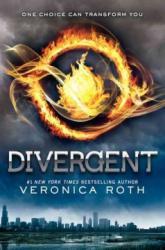
I loved this book! It is way better than the movie. It is about Beatrice Prior, a 16 year old girl. In her world there are 5 factions in which most everyone belongs. She is apart of abnegation, the selfless faction, but doesn't feel that she is selfless enough so she decides to switch to dauntless, the brave faction. The book is about how she has to over come her inner cowardice and pass initiation. If she does not pass then she becomes factionless and will spend the rest of her life homeless and begging for food. The only thing that is holding her back is that Tris is divergent and if your divergent in this society then you are basically as good as dead. She has to keep her secret a secret while also managing to remain in a safe place in initiation. It also has some romance as her instructor, Four, tries to help her become better at fighting. The book has a lot of action and keeps you on the edge of your seat through the whole thing.
Reviewer Grade: 8
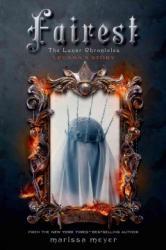
Anyone who has enjoyed The Lunar Chronicles would totally love this book. It definitely changed my perspective on Levana and helped me to understand her personality more when I read Winter, the last book in the series. The book talks about why she wears her glamour all the time and what scarred her face.
It also covers what made her so evil and vicious. Not only that, but it explains what compelled her to attempt to kill her niece, Princess Selene.
This book is a must read with the whole Lunar Chronicles series and helps to understand both sides of the story.
Reviewer Grade: 8
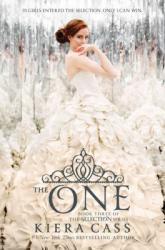
The One by Kiera Cass is the third book in the Selection series. In this book prince Maxon of Illea has to choose a princess and wife from the Elite. Will Maxon choose America or will he choose another?I would rate this book a four out of five because at some points it was a bit redundant, but the romance between America and Maxon was breathtaking and sucked me in. I would recommend this book to anyone who likes romance and dystonia. I am in eighth grade and I am 14.
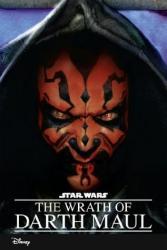
Going back to Star Wars Episode 1: The Phantom Menace, Star Wars The Wrath of Darth Maul follows the life of Darth Maul, one of the main antagonists of the movie, and gives insight of the character’s childhood, opportunities, and future. We all know that Obi-Wan had “killed” Maul on Coruscant, but Maul continued to live within the deep dark hole, though inhumanly. The novel starts out by giving insight about how Maul came to affiliate with the Sith and some information about his home planet, Dathomir, and explains all the way up to when he fights Qui-Gon and his bisected by Obi-Wan. We get to feel the emotions of Maul, as the book is in 3rd person limited, and the book gives some invaluable information that could clarify some misconceptions within the movie. Ryder Windham did an amazing job on giving essentially a biography about Maul and his life. I recommend this book exclusively to Star Wars fans, especially those who are interested in little screen-time, overlooked characters, such as Darth Maul.
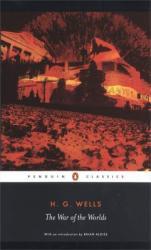
At only a smidgen under two-hundred pages, this book appeared to be a concise and quick read. Surprisingly, my experience was quite the opposite. The War of The Worlds presents a typical scenario that many novels have sadly claimed. The initial third is gripping and chocked full of descriptors and entertainment; the second third is nearly pointless to the main plot; the concluding third wraps the story up, leaving enough aspects unresolved for the imagination to expand upon, but doesn't carry on the initial third's promise. Thus, leaving the reader confused and with a feeling of wasted time.
Initial Third:
After reading the beginning chapters a sense of urgency becomes the overlying theme. Peril soon engulfs the novel's setting as its characters realize the grave situation. The Author takes his time here by writing pages of description to meticulously set the scene. The story progresses to a small climax at the end of this third, which casts a shadow of high expectation on the other two thirds. This initial third is a marvel of a opener that brings honor to the class of classic English-literature.
Second Third:
If paper could speak to its reader it'd ask that they'd grip their new-found excitement and trudge through the muck. The majority of this third's viewpoint comes from that of a flat secondary-character with little importance to the story. This characters presence only delayed the objectives that the first chapter created. Their travels were hectic; slightly smile inducing at times. Taking this character shift seriously was difficult as the pages grew thinner and crucial answers were yet to be disclosed. The author even goes as far as giving a figurative apology for sidetracking the reader at this third's close; H. G. Wells' canny sense of humor makes an unexpected appearance here.
Concluding Third:
After hope for the story as-a-whole was drained, Wells restored the glorious successes of the initial third, but not fully. Excitement and intensity were brought back as the conclusion drew nearer. The story abruptly shifted to the round, main-character, again; swapping character who're in different settings is usually abrupt, so this isn't a true issue. This character goes on to see the conclusion, which wraps up most of the events and questions that the previous content created.
My Take:
I didn't find this novel to be terrible or great. It proved to me that it's a mediocre work glossed with wild literary technique and vocabulary. Wells' persistence use of over description dimmed the natural flow and appeal of his writing. There's little reason to use half a page or more to describe minute details. It would have been better if he spent the time to detail the larger picture, rather than tiny scenes. Character development was superb at first, but fell flat due to the second third's character shift. If the second third was omitted in its entirety and, then rewritten without the secondary-character's perspective the novel would be vastly improved. Wells wasn't an illiterate fellow with corn for brains. His derailing of the story added multiple perspectives and was most likely an attempt to add another dynamic. The incessant over-descripting showcased his incredible vocabulary while portraying him as an over confident writer. Paying closer attention to the plot and character development will lead to a better story than any amount of impressive vocabulary ever could. It's clear that H. G. Wells is a gifted and skilled writer, but this certainly isn't a jewel.
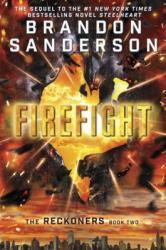
This book is the second in the Steelheart series, and it is a great story. It has fantastic characters, great descriptions of locations, and a bunch of plot twists that keep you on your feet. The plot may be confusing at times, but it all makes sense in the end. There are plenty of details that make an appearance in the next book too! Overall, I think this is a very good book.
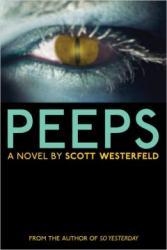
Peeps is an amazing book that takes a interesting, scientific approach to vampirism. It is centered around Cal Thompson a carrier of a unique parasite that causes aversion to light, heightened senses, and cannibalistic impulses. Because Cal is only a carrier he shows none of the extreme symptoms of the parasite. At the beginning of the book, Cal has had the parasite for a year. With the help of the Night Watch, a shadowy organization that hunts down parasite positives, or 'peeps', and a girl named Lace, he is tasked with capturing all of the girls he gave the disease to in that year. Filled with information on real parasites, this book is definitely not for squeamish people. Peeps also has a little content that some people might not be comfortable with. That being said, this is a great book and an interesting take on the idea of vampirism. I would strongly recommend this book to anyone that enjoys science fiction, or any of Scott Westerfeld's other books.
Reviewer Grade: 9
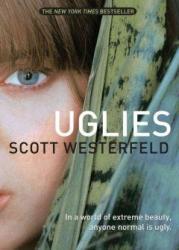
All Tally Youngblood ever wanted was to be a pretty. Now Tally is almost sixteen years old, and in just a few weeks, she will get the surgery that will make her beautiful. When she meets Shay, a girl with many new ideas, Tally is told about a reclusive group called the Smokies that keep their own faces. Shay, a few days before their birthday, runs away and joins them, leaving Tally to explain to everyone where her friend is. Because of Shay, Tally is forced into a world that she wanted no part of. To become pretty, Tally must betray Shay and all of her new friends. As she realizes the truth behind the operation, Tally starts to enjoy her new life. Uglies, the first book in the series, is a great dystopian book. With an amazing plot, and complex characters, I highly recommend it to anyone that enjoyed Divergent or any of Scott Westerfeld's other books.
Reviewer Grade: 9
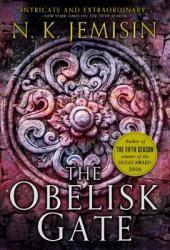
I previously reviewed the first book in this series, The Fifth Season (http://ppld.org/book-reviews/fifth-season). This was a strong second entry, and on reflection I ended up liking it even more than the original book. The plot is far more linear than in The Fifth Season, but there are still unexpected twists and turns, and for me the characters really came into their own here. You will see some old, familiar faces along with a number of new additions to the cast from regions of the world we hadn't previously been exposed to. There was one character in particular whose story-line took a surprising turn that caused me to do a complete 180 on how I saw them. For me, it hit all the right notes: deeper world-building, strong characterization, and a complex plot that held up to closer scrutiny.
If you haven't finished the first book, the next part of this review will include minor spoilers. The Obelisk Gate picks up where The Fifth Season started, with Essun discovering her murdered son just as the Season hits. While the previous book then went back and forth in time to explore how she had arrived at that point, this one moves us into the future as she sets off in pursuit of her husband (Jija) and daughter (Nassun), hoping to rescue Nassun before she meets the same fate as her brother. The chapters alternate between Damaya/Syenite/Essun's journey and her daughter's, with the odd interlude featuring someone else. The narration is still in its distinctive second person format, but in this book we finally learn who the speaker is. In my opinion, Jemisin answered just enough questions from the first book while still leaving mysteries for the finale, and I can't wait for the third and final entry in the series (projected release in 2017). Highly recommended to lovers of fantasy!
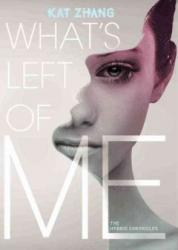
What’s Left of Me, a dystopian novel by Kat Zhang, follows the life of Addie and Eva, two souls living in one body while trying to hide their secret from the totalitarian government. In their society, everyone is born with two souls. Eventually, they are supposed to settle by a young age, meaning that the weaker soul would fade away and die. In their world, every hybrid was arrested, never seen again. They (Addie and Eva) never settled, but the government didn’t know. Everyone thought that they had settled at the age of twelve, even their own parents. Eva just lost control of their body. She was still able to communicate with Addie through thoughts. Then, a girl from school told her that she knew their secret and offered to bring Eva back.
Riskily, they agreed. Will they succeed or get caught in the act?
This is a very interesting book. I think I enjoyed the beginning of the novel most, where it talks about what it means to be a hybrid in their society. It really made me think about what it would be like to have another soul in my body, to share everything with her. It made me so curious, I googled if everyone is born with two souls. However, I would not be compelled to pick up the sequel for the book. I did not enjoy it as much as I have other dystopian novels. While amazing and thought provoking at the beginning, it just had a downfall at the end, becoming more confusing and dull as the book went on. The romantic subplot didn’t make very much sense, because that would be very awkward for the other twos would who would have to be dragged into it. Also, it needs to be more descriptive. The setting and protagonist were barely described, leaving the reader with a fuzzy image. The negatives aside, this was a wonderful book. What’s Left of Me is a great book for teenagers, even though it is officially labeled as a young adult novel.
Review Grade: 8
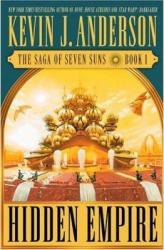
Hidden Empire is the start to the "Saga of the Seven Suns" series by Kevin J. Anderson, an author of dozens of Bestselling and award-winning sci-fi books. If you haven't heard of Kevin J. Anderson, it's probably because a great deal of his writing is done for other pre-existing franchise licenses (Star Wars, Dune, movie novelizations, etc...) where the author’s name tends to less noticed. Having had no previous familiarity with the author myself, I took a gamble on this one when I passed by his publisher’s booth at Denver Comic Con, and had a bit of money still burning in my pocket. I've been pleasantly surprised and now that I’m 3 books in, I think the series is holding up fantastically.
Hidden Empire tells the story of human ingenuity turned reckless by greed. When the Terran Hanseatic League ignites a gas giant into the first man-made star, they awaken a slumbering threat, and inadvertently start a war that threatens to destroy all of human civilization. The enemy is ruthless and unimaginably powerful, and worse yet, the various factions of humanity are divided by their own conflicts and prejudices.
Saga of the Seven Suns is a classic space opera of galactic proportions with a close focus on its characters. It skips the focus on justifying realistic technology that is common in "hard" sci-fi, and though the plot revolves around a war, it is not "military" sci-fi either, in that it's less about space marines and more about xeno-archaeologists and politicians. This is a people-centric story all the way, with the spotlight on the struggles of the individual characters as they each try to navigate the webs of intrigue, conflicting cultural values, and ancient secrets that surround them. Think the grand scale of Star Wars mixed with the plot style of Game of Thrones, featuring a varied cast of Point-of-View characters whose stories conflict, intersect, and illustrate the plot from different perspectives.
Speaking of Game of Thrones, did I mention that this 7 book series has already been completed and fully published? You get all the thrill of binge-reading a sweeping saga that will keep you entertained for months, without have to wait around for 5 years for the resolution to that torturous cliffhanger! There's also a handy glossary at the back of the book to help you keep track of the different people involved in this intricate story.
Note: This book is not to be confused with Hidden Empire by Orson Scott Card. While Card's name is likely more recognizable, Anderson's book was published 2 years prior.
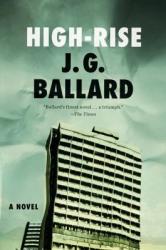
High-Rise (1975) begins with one of the most memorable first lines I’ve ever read, "Later, as he sat on his balcony eating the dog, Dr. Robert Laing reflected on the unusual events that had taken place within this huge apartment building during the previous three months". Laing is a new tenant in a futuristic high rise apartment building on the outskirts of London. The high rise is a microcosm containing restaurants, playgrounds, a swimming pool, and even its own supermarket. There is social order: the wealthiest tenants occupy the building's upper floors with the best views, while the middle-class tenants reside in the lower half of the building, constantly at the mercy of falling champagne bottles from the upper floors. Before long, tensions arise between the tenants of the upper and lower floors. Alternating between Laing and another tenant, Richard Wilder, we witness first-hand the deterioration of ethics and social order within the high rise. Elevators are commandeered, rooms are barricaded, alliances are formed, and blood is shed. Little by little, the layers of human behavior are peeled back, exposing a terrifyingly animalistic core at the heart of the high rise tenants.
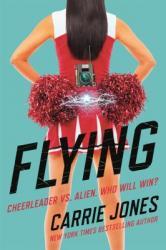
Mana is going along in her perfectly normal life as a high school teenager with two best friends, one of whom is a boy and crush interest. All of a sudden a guy (codename China) taking out an alien, who happens to be hiding out as a cute boy at her school, interrupts a basketball game, and Mana’s world drastically changes. She finds out her mom is also an alien hunter and has disappeared, presumably kidnapped by aliens because of a chip with information she has. To top it off, Mana starts having some weird abilities, like being able to jump really high and do crazy gymnastic stunts. The rest of the book has Mana, her friends, and China on a mission to find Mana’s mom and save the world.
I really liked Carrie Jones’s series, Need. This was definitely a different kind of book. It was lighthearted and, at times, a bit silly, but overall, still a nice, light, fun read.
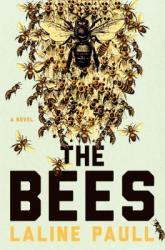
My first thought when this book was recommended to me was, “Bees? Is that metaphor? What do the bees stand for?” NOPE. This book is literally about bees. But not in a nonfiction, documentary kind of way. Here we have a novel in which we discover the world of bees personified.
Enter our main character, Flora 717. She was born the lowest of the low: the sanitation worker bee. Ugly, underappreciated, but unlike her fellow floras, she can speak. One of the higher levels of bees, a priestess to the queen, immediately takes notice of her oddities and experiments with her in roles not typical to a flora.
Flora 717 finds herself in almost every aspect of bee life at some point of her journey through the hive, uncovering secrets as she learns, grows, experiences the most profound loss, and transcends to the highest joys. The ordinary life of these black and yellow creatures we see and often fear is re-imagined into a relatable tale that pierces the veil between bees and humans. Though humans play very little role in the book, the bees exhibit many characteristics of humanity.
The tone of this book can be a bit dark at times with graphic imagery, but I highly recommend it.
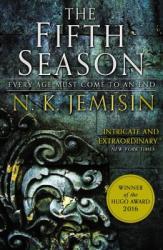
I loved this book. I've been looking for a new fantasy series for a long time now, but I haven't come across anything recently that's caught my eye. I almost gave up on The Fifth Season too, in part because the narration is in second person, which I found jarring at first, and in part because Jemisin drops you in the middle of the action with little explanation and no hand-holding. It took me a few chapters to get into the story and figure out what was going on, but I'm glad I stuck it out because the plot and characters ended up being great. Despite what I just said, I think it's almost better to go into this blind, but I'll try to describe it without giving too much away.
The continent our characters live on, "The Stillness," is a post-apocalyptic hellscape. There is near-constant seismic activity that triggers a new catastrophe (called a "Fifth Season") every few centuries -- sometimes in the form of massive crop-failures, sometimes in the form of volcanic eruptions, sometimes massive earthquakes that destroy whole regions (she includes a helpful appendix of these disasters if you're curious). In this world, there is a group of people known as orogenes (or more derogatorily as "roggas") who have some degree of control over seismic activity -- they can "sess" earthquakes, and, with training, prevent them from being too destructive. But they're also powerful, extremely dangerous, and widely despised -- many people kill their own children when they discover what they are, and it's often a race against time to see if a Guardian (their mysterious and sinister keepers) can arrive to collect the child before the family or the community has killed them. The plot isn't chronological; it moves around from chapter to chapter in order to tell three stories at three points in time: 20-odd years ago, when a young girl is taken to the capital to be trained as an orogene; some 10 years after that when a mid-level orogene goes off on a mission with her senior to investigate a disturbance in a coastal community; and "now," in the immediate aftermath of the latest apocalypse, when we follow a woman who is struggling to cope with her son's murder just as the quake hits.
I'm not going to say that it's an entirely original idea, but I think the execution was solid and I loved the dialogue and cast of characters. There's no lack of action, but Jemisin also takes the time to dig into her characters' emotional lives, and after a while the use of "you" starts to fade into the background. There's a strong focus on discrimination, both in terms of how orogenes are viewed in society and in terms of the treatment of subordinate nations and peoples by the Sanzed Empire that has conquered the continent. A lot of fantasy is set in pseudo-Europe (and often just pseudo-England), so it was refreshing to read something more diverse, and there's a wide variety of representation in terms of race, gender, and sexuality throughout. I would give this 4.5/5 stars if that were possible, but since it isn't I've left it at 4. It wasn't perfect, but it was a very strong start to the series, and I look forward to starting the second book, The Obelisk Gate, which just released this September. I would definitely recommend this to fans of fantasy.
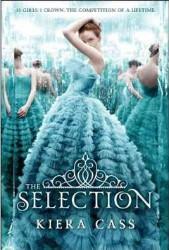
America Singer has been forced to enter in a competition to win Prince Maxon's heart. There's only one problem: she's in love with someone else. Marked by a brutal social class system, America either has the option to marry within her class or above it. She cannot marry her boyfriend Aspen Ledger, who is a class below her. So, she must enter "The Selection" to compete with a number of other girls for Prince Maxon's hand. Although the characters and plot were complex, I felt this book was lacking something - perhaps the conflict wasn't quite strong enough? I still recommend it for its excellent world-building and characters. (I'd rate this PG-13 for minor language and some romance)
Reviewer Grade: 9
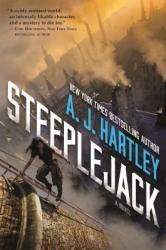
Anglet is a steeplejack, a person who climbs buildings for a variety of work related reasons (chimney work, retrieval, the building of things, etc.). One day, at the end of a shift, she discovers a dead body on the ground. As being a steeplejack is quite dangerous, she isn't completely alarmed at first, until she realizes that the person did not die of natural causes - he had been stabbed in the back. After that, she takes it upon herself to solve the murder mystery as well as a few other mysteries that crop up along the way.
I feel like I should've liked this book more than I did. The beginning is extremely slow, but only due to the author having to do some serious world-building, which is something I often like. The world itself was pretty cool. It's a newly colonized version of South Africa, which made for a unique setting. Actually, the racism/discrimination bits were so well done as to be hard to read. The main character is likable. She's that lovely combination of fierce and vulnerable that is common in YA, but rarely successfully pulled off. Hartley pulls it off. He knows what he's about - this book was extremely well written.
So why didn't I like it? I'm kind of asking myself the same question here, but my overall feeling was definitely just "meh". I think that, for me, the book lacked any real tension or emotional impact. I liked Ang, but I never really cared that much about her, or anyone else in the story. I definitely didn't care about Berrit, the murder victim. Actually much is made about how NO ONE cares about Berrit and his life was one that wasn't going to be worth living anyway, so...who cares who murdered him, really? Aside from a few terrifying scenes featuring her would-be rapist/boss (and a few other emotional but spoilery scenes) the book went from action scene to action scene with no real emotional impact, and without feeling like it was fast paced. Somehow, in the midst of all of the action, the book felt like a really slow read, mostly because I just couldn't make myself care about the fates of most of the characters.
With a more compelling mystery and better developed characters, this book could've been very likable. Still, I think many will like it, and I'm definitely not opposed to picking up the sequel. 2 stars - it was ok.
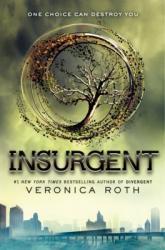
This book is full of love, excitement, and hardship.
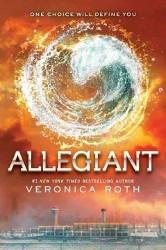
Allegiant by Veronica Roth was a disappointment to me. Honestly it was very poorly written. The book is in both Tris' and Four’s perspective, which I usually like, but it was very difficult to distinguish the two. Most books I read, when in different perspectives they think differently and have a different structure of thinking, but Four and Tris have the exact same thoughts all the time. The only difference is that Four tells Tris no, when she wants to do something. This was the worst book in the series, and was extremely slow.
Reviewers Grade: 7
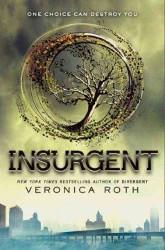
Insurgent by Veronica Roth, the second in the Divergent series, was very well written. I feel the relationship between Beatrice (better known as Tris) and her instructor/boyfriend Four was very well thought out. This book made me yearn to read the last one quickly. The book’s main plot was amazing, and Insurgent was absolutely amazing when it came to the developments of its characters.
Reviewer Grade: 7


